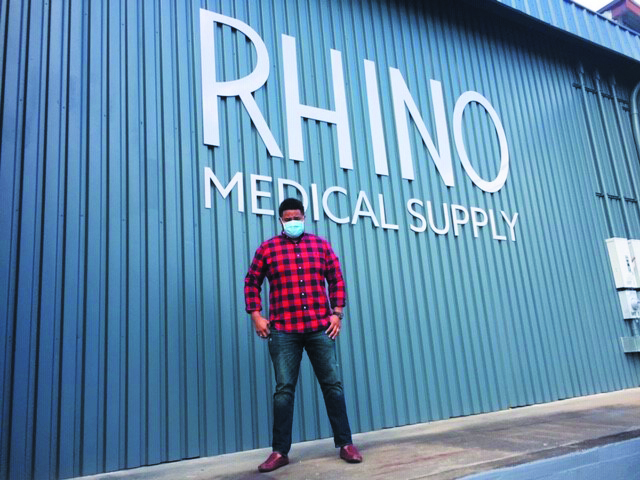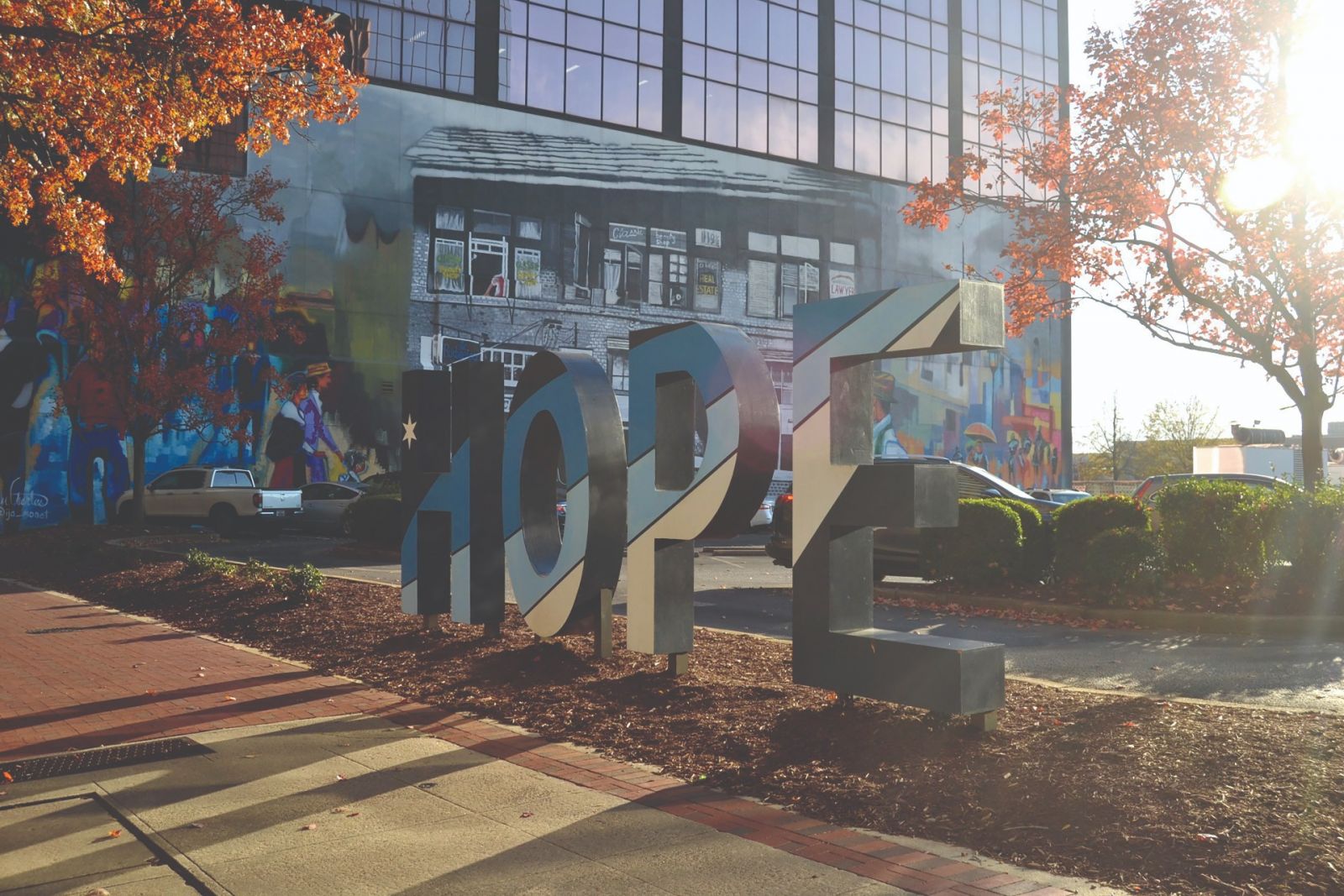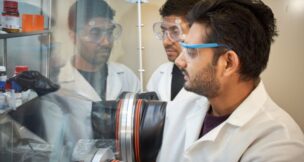Businesses, leaders set sights on post-pandemic priorities for 2022
Melinda Waldrop //January 26, 2022//
Businesses, leaders set sights on post-pandemic priorities for 2022
Melinda Waldrop //January 26, 2022//

This time last year, Lance Brown was still getting his arms around his new career path. Now, that path has become a bustling thoroughfare.
Brown, president and CEO of Columbia-based medical supply distributor Rhino Medical Supply, busily built relationships with customers and manufacturers after founding the company in May 2020. Now, he’s focused on selling products.
“Anything under a hospital roof, we can get, and we’ve been selling,” Brown said.
That includes crutches, in demand because of a nationwide aluminum shortage, nitrile gloves and at-home COVID-19 tests coveted by retail customers and wholesale clients such as pharmacies.
“We ship out all over the country, but we’ve gotten a heavy response from the state of South Carolina and local folks in the Columbia and Midlands area that are just doing pickups,” Brown said. “Literally, about every 10 minutes, we have somebody come and do a pickup. … There’s somebody coming in now.”
Brown’s small business-success is what S.C. legislators and business leaders want to see more of as the state and the nation navigate a post-pandemic future.
The S.C. Chamber of Commerce released its 2022 Competitiveness Agenda earlier this month, calling for lawmakers to reduce both personal and property tax burdens and to inject investment into workforce development initiatives, among other priorities.
“Our No. 1 priority is tax reform and tax cuts,” Bob Morgan, president and CEO of the chamber, said before the organization’s Business Speaks dinner Jan. 12 at the Pastides Alumni Center in Columbia. “The state is flush with a $3 billion surplus, and we’d like to see cuts in the personal income tax rate. We’d like to see commercial property tax rates addressed, and we’re hopeful that that will be part of the discussion as the session moves forward.”
Legislators and Gov. Henry McMaster pledged to keep that momentum going. McMaster’s 2022-2023 executive budget proposes plans for investing that surplus, along with $2.4 billion in coronavirus relief funds provided by the American Rescue Plan Act, a $1.9 trillion relief fill approved in March 2021.
“If we take advantage of this once in a lifetime opportunity – by making big, bold, and transformative investments in the areas of education, infrastructure, workforce, and economic development, South Carolina will prosper for generations to come,” McMaster wrote in a letter to the General Assembly.
The budget calls for a proposed 1% rate reduction over five years, from 7% to 6%, for all personal income tax brackets, $120 million for K-12 education funding reform and $500 million (non-recurring) and $100 million (recurring) to the S.C. Department of Transportation to upgrade the state’s network of roads and bridges, among other proposals.
South Carolina has the highest marginal income tax rate among Southern states and ranks 31st in the nation for overall business tax climate, including a No. 36 ranking for property tax, according to national nonprofit The Tax Foundation.
“I think South Carolina’s income taxes are too high,” Senate Majority Leader Shane Massey told the Business Speaks audience, adding that property taxes are sales taxes are no better. “We’re clearly out of line with a number of our sister states, and it makes us less competitive.”
The executive budget also proposes recommendations for ARPA funds, including $400 million to expand broadband access, $124 million to expand the Workforce Scholarships for the Future program targeting high-demand careers in technical fields, and $250 million allocated to unemployment trust fund and small business assistance.
“Like every other state, we don’t have enough workers,” Morgan said. “We’re fortunate that people continue to move here. We’re the 10th-fastest growing state in the country, and we still have more jobs going unfulfilled than we have people who are looking for work.”
Workforce shortages have also contributed to supply chain woes that have clogged the flow of goods from manufactures to consumers as the pandemic wears on, Morgan said.
“There are goods that are sitting offshore that, because of a lack of workers, because of a shortage of computer chips, we’re not able to bring product to the market at a time when products produced in South Carolina are in greater demand than ever before,” Morgan said. “The private sector, frankly, is going to have to figure that out, in partnership with the ports and the trucking industry and others. … Our economy is doing very well, but it could be doing so much better.”
A story of success
A major step in moving his business forward, Brown said, was onboarding with NDC, one of three major players in the health care industry that coordinates supply chain solutions for more than 1,200 distributors in North America and 700-plus health care manufacturers.
“Before, let’s say we had relationships with 30 or 40 individual manufacturers. So depending on what we wanted to order and depending on which manufacturer made it, we would have to deal directly with them,” Brown said. “What NDC does is they consolidate all that, and then we have access to over 300 manufacturers through NDC.
 “It makes it easier for us, it makes easier for our customers. Our customers, our hospital systems, don’t have to have 20 different trucks backing up. They can get a pallet with 20 different products on it.”
“It makes it easier for us, it makes easier for our customers. Our customers, our hospital systems, don’t have to have 20 different trucks backing up. They can get a pallet with 20 different products on it.”
While health care providers are and will remain the focus of Rhino’s business, its growth has helped it serve smaller-scale customers looking for resources amid the surge in the omicron variant of the coronavirus. Rhino has helped a local restaurant worker, afraid he had been exposed to COVID-19 and in need of an at-home test because calling out of work without a positive result meant risking termination, among other individual examples.
“We had a gentleman drive from Charlotte to pick up 15 boxes because his wife and his newborn both had COVID, and he can’t reunite with them until everybody tests negative,” Brown said. “He waited in line for four hours in Charlotte, and when he got to the front of the line, they were sold out. You get stories like that all the time.”
Rhino offers both pickup and contactless local delivery for the tests, and Brown said its warehouse inventory currently allows for same-day shipping — though it reorders frequently from a manufacturing partner producing 400,000 boxes, each containing two tests, a day.
“There’s a direct correlation: Any time there’s a surge in cases, we see a surge in business,” Brown said. “We try to stay ahead of it, where we keep inventory in so that we can ship out the same day so we can be competitive with some of the other guys. And more importantly, we value the relationship with all of our customers, so we try to give them that attention where it’s just not transactional.”
Those relationships are what have kept Rhino going strong amid the ups and downs of the pandemic and are what Brown says will keep the company relevant — and profitable — in whatever a return to normal looks like.
“It goes to the work that we’ve been putting in since we started to develop these relationships with the manufacturers so that when times like this happen, we already have a supply chain,” he said. “We’ve already been dealing with them, and we’re trusted. They know who we are. They know who our end users are. We’re not trying to broker it or anything like that.
“Our goal is to get these products, whatever they are, into the hands of the people that need them to help save lives. … We’ve still got a long way to go from where we want to be as a company, but our goal of making sure that when COVID is over, Rhino Medical Supply is going to be a sustainable business — we’re well on our way to that.”
Down on Main Street
About three miles from Rhino’s Rosewood Drive headquarters, Columbia’s central business district is bustling with new businesses.
Matt Kennell, CEO of downtown economic development organization City Center Partnership, said that while the Main Street business owners he talks to remain concerned about COVID-19 and the labor market, growth isn’t slowing.
“It just keeps chugging along. It’s like The Little Engine That Could,” Kennell said. “We just see continued growth, particularly in the hospitality sector — where jobs are most in demand, interestingly enough.”
The Cambria Hotel in the Congaree Vista is slated to open this spring, while another hotel, the Moxie, is under construction at 1200 Main St. Another boutique hotel is coming to Assembly Street, Kennell said, while downtown residential development continues to boom.
The Standard, a 17-story student housing tower at the corner of Assembly and Washington streets, is well under way, while the Palms of Lady expects to begin leasing next month.
 New restaurants are popping up all along Main Street. Vista restaurant 929 Gervais is expanding with another property, a 65,000-square-foot Korean barbecue restaurant, at 1333 Main St., while Greek restaurant Ambrosia is opening soon in the 1700 block. Prohibition, a Charleston-based speakeasy cocktail bar concept, is coming in the spring to the former Main Street Public House spot at the corner of Main and Taylor, while The Strudel Shop, a new bakery, is holding its grand opening at 1237 Washington St. on Jan. 27.
New restaurants are popping up all along Main Street. Vista restaurant 929 Gervais is expanding with another property, a 65,000-square-foot Korean barbecue restaurant, at 1333 Main St., while Greek restaurant Ambrosia is opening soon in the 1700 block. Prohibition, a Charleston-based speakeasy cocktail bar concept, is coming in the spring to the former Main Street Public House spot at the corner of Main and Taylor, while The Strudel Shop, a new bakery, is holding its grand opening at 1237 Washington St. on Jan. 27.
Takosushi’s much-anticipated return to the Columbia area is slated to happen by the end of the month in The Arcade building, while Taco Grande is opening on Hampton Street in the spot formerly occupied by Fancy That Bistro and Sky Bistro Lounge is coming to 1120 Washington St.
“It’s almost like one a day. Many of these spots that have been vacant for a long time are filling up,” Kennell said.
The robust retail scene isn’t limited to restaurants. Maternity shop Sneak a Peek is open next to Oliver Gospel Mission, which is launching a high-end thrift shop on Taylor Street. And Shivas Spa, slated to occupy 1716 Main St, is part of a growing push past the 1600 super block.
“I think you’re seeing things pushed solidly into the 1700 block, even into the 1800 block,” Kennell said. “We’re also seeing some growth on the side streets that we’ve been looking for, some of the projects on Taylor and Washington.”
One area that has felt more negative effects from the pandemic is the Columbia office market, which a recent Colliers analysis found to have a 15% vacancy rate, up from 14% in the third quarter of 2021 and 13.9% in the fourth quarter of 2020.
“That’s an issue to watch,” said Kennell, who estimated the vacancy rate on Main Street at around 10%. “But as far as the social aspects of the (city) center, it just seems like things are pretty good. People are — when they’re not quarantining, they’re out downtown.”
-














